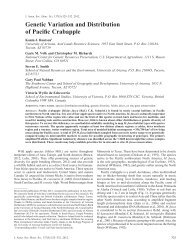CONSERVATION
Conservation You Can Taste - The Southwest Center - University of ...
Conservation You Can Taste - The Southwest Center - University of ...
- No tags were found...
You also want an ePaper? Increase the reach of your titles
YUMPU automatically turns print PDFs into web optimized ePapers that Google loves.
INTRODUCTION<br />
What is Food Biodiversity and Why Does It Matter?<br />
Gary Paul Nabhan, Kellogg Endowed Chair in Sustainable Food<br />
Systems and founder, Renewing America’s Food Traditions<br />
ALTHOUGH the term biodiversity was not even coined until 1985, the<br />
more particular term food biodiversity now helps us describe the cornucopia of<br />
distinctive kinds of fruits, nuts, vegetables, tubers, greens, herbs and oilseeds that<br />
we intuitively associate with flavor, nutrition, food security, abundance and health.<br />
In a broad sense, the actual number of food varieties that we eat is but a fraction<br />
of the total agricultural biodiversity on farms and ranches required to assure that<br />
food crops and livestock are fed, protected from winds or floods, and supplied<br />
with adequate water, forage, nutrients, pollinators and other beneficial insects to<br />
assure a harvest. As noted in the book Where Our Food Comes From, “Agricultural<br />
biodiversity is embedded in every bite of food we eat, and in every field, orchard,<br />
garden, ranch and fish pond that provide us with sustenance and with natural<br />
values not fully recognized. It includes the cornucopia of crop seeds and livestock<br />
breeds that have been largely domesticated by indigenous stewards to meet their<br />
nutritional and cultural needs, as well as the many wild species that interact with<br />
them in food-producing habitats. Such domesticated resources cannot be divorced<br />
from their caretakers. These caretakers have also cultivated traditional knowledge<br />
about how to grow and process foods; such local and indigenous knowledge—<br />
just like the seeds it has shaped--is the legacy of countless generations of farming,<br />
herding and gardening cultures.”<br />
12



